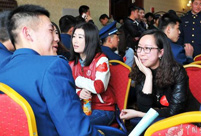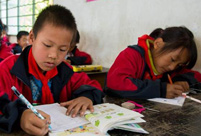 'Model husband' shatters image of love
'Model husband' shatters image of love
 Can animals smile? Or put on a happy face
Can animals smile? Or put on a happy face
 Geng Xuan crowned at 9th China Super Model Contest
Geng Xuan crowned at 9th China Super Model Contest
 Top 10 billionaires in the liquor industry
Top 10 billionaires in the liquor industry
 Backstage at China Fashion Week
Backstage at China Fashion Week
 Ballerinas anywhere but onstage
Ballerinas anywhere but onstage
 Top 10 safest airlines in the world
Top 10 safest airlines in the world
 Posters of 33rd HK Film Awards unveiled
Posters of 33rd HK Film Awards unveiled
 Top 10 most popular instant messaging apps in the world
Top 10 most popular instant messaging apps in the world
 Inspiring shadow images of Chinese army
Inspiring shadow images of Chinese army
China's exports slumped 6.6 percent year on year in March mainly due to a large base figure inflated by rampant over-invoicing in the corresponding period last year, customs data showed on Thursday.
Exports dropped to 170.11 billion U.S. dollars and imports were down 11.3 percent to 162.41 billion U.S. dollars, the General Administration of Customs (GAC) said.
Total foreign trade volume declined 9 percent over the previous year to 332.52 billion U.S. dollars, and the trade balance returned to a surplus of 7.71 billion U.S. dollars in March after a deficit in the previous month, according to the administration.
In the first quarter, combined exports and imports declined 1 percent year on year to 965.88 billion U.S. dollars.
GAC spokesman Zheng Yuesheng played down the drop in exports, attributing it to a high base figure in March last year that was distorted by illicit transactions through Hong Kong.
Exports at this time last year were significantly inflated due to over-invoicing to disguise capital flows and evade currency controls. In the first quarter of 2013, illicit transactions through Hong Kong allowed exports to balloon by more than 20 percent year on year, previous figures showed.
Zheng said China's trade with all major partners grew in the first quarter with the exception of trade with Hong Kong, which recorded a sharp 33.3-percent drop year on year.
China's trade with the European Union, the United States, Japan and the ASEAN rose 6.3 percent, 0.9 percent, 2.6 percent and 2 percent respectively over a year ago in the first three months.
"The slump in trade with Hong Kong drove down the overall growth in the first quarter by about 4 percentage points," said Zheng.
"Trade with Hong Kong returned to normal in mid-April last year, so we expect China's export growth to Hong Kong to pick up significantly in May this year," he explained.
"The declining trend in exports will be temporary and short-lived. China's foreign trade will recover in May," the spokesman forecast.
Zheng's view is echoed by Zhang Zhiwei, chief China economist with Japan's Nomura Securities.
"Taking into account the issue of mis-invoicing in export data, we believe actual export growth may have improved to 5 to 8 percent year on year in March from around 3 percent in the Jan.-Feb. period," wrote Zhang in a research note.
The GAC's Zheng also pointed out some underlying strength in exports. Exports of labor-intensive products, despite a decline of 6.4 percent in the first two months, registered a 6.8-percent growth in March, reflecting the country's competitiveness in the global trade, he said.
China also saw a rise in exports of cellphones, vehicles and cables in the Jan.-March period.
Zheng said imports declined due to lower commodity prices in the world market, citing a drop in the overall import price index.
The index stood at 95 in the first quarter, indicating a 5-percent drop in the prices of imports over a year ago. Meanwhile, the index for overall import volume stood at 104, meaning an increase of 4 percent in the amount of imports.
Although China is faced with downside economic pressure, its demand for commodities from the global market kept stable, Zheng noted.
He predicted that China's exports will see moderate growth this year, helped by recovery in the global economy, China's reform initiatives and the country's opening-up efforts.
Despite more competition from neighboring countries and regions and trade frictions with major trade partners, it is very likely that China can achieve its trade growth target of 7.5 percent this year, said Zheng.
Chinese Premier Li Keqiang on Thursday expressed confidence that the country can keep its economy functioning within the proper range.
"With all the principles established and policy options at our disposal, we can handle all possible risks and challenges. China's development has strong resilience," said Li at the opening ceremony of the Boao Forum for Asia (BFA) annual conference 2014.
"We will not resort to short-term stimulus policies just because of temporary economic fluctuations and we will pay more attention to sound development in the medium and long run," according to the premier.
Li last week chaired a State Council meeting where growth-supportive steps were announced including cutting tax for small businesses, facilitating shanty-town renovation and speeding up railway construction.
Rather than being seen as stimulus policies, it is believed that these fine-tuning measures will stabilize growth by enhancing economic efficiency while avoiding future financial troubles.
HSBC Chief China Economist Qu Hongbin said the policy package, combined with implementation of reform measures such as lower entry barriers for private investment and abolishing more unnecessary administrative approvals, could provide a cushion for China's economic growth as well as import demand.
Zhang Zhiwei also said there is scope for the government to stay the policy course and not announce new easing measures in April as it waits to see how the economy responds to the measures announced in recent weeks.
 Wonderful moment of China's airborne forces
Wonderful moment of China's airborne forces Bai Baihe shoots for fashion magazine
Bai Baihe shoots for fashion magazine Red terraced fields in Dongchuan of Yunnan
Red terraced fields in Dongchuan of Yunnan Jiaju Tibetan Village
Jiaju Tibetan Village Spring dating
Spring dating Confucius institute at UC Davis
Confucius institute at UC Davis Little painted faces at temple fair
Little painted faces at temple fair Top 10 safest airlines in the world
Top 10 safest airlines in the world Foreign students at China-Myanmar border
Foreign students at China-Myanmar border The backstage of the Fashion Week
The backstage of the Fashion Week College students in Han costumes
College students in Han costumes Postgraduate works as waitress
Postgraduate works as waitress Life in a Lahu village in Yunnan
Life in a Lahu village in Yunnan An orphan’s wedding
An orphan’s wedding Hollywood documentary brings Diaoyu Islands truth to new audience
Hollywood documentary brings Diaoyu Islands truth to new audienceDay|Week|Month